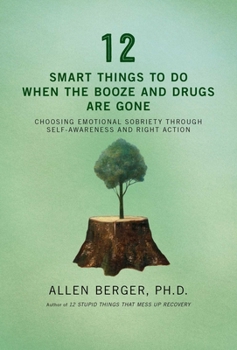12 Smart Things to Do When the Booze and Drugs Are Gone: Choosing Emotional Sobriety Through Self-Awareness and Right Action
Select Format
Select Condition 
Book Overview
The author of the classic 12 Stupid Things That Mess Up Recovery offers a fresh list of "smart" things to do to attain and sustain emotional sobriety. Learn the attitudes and behaviors that are key to attaining and sustaining emotional sobriety and developing a deeper trust in the process of life. Dr. Allen Berger draws on the teachings of Bill W. and psychotherapy pioneers to offer us twelve hallmarks of emotional sobriety...
Format:Paperback
Language:English
ISBN:159285821X
ISBN13:9781592858217
Release Date:July 2010
Publisher:Hazelden Publishing & Educational Services
Length:192 Pages
Weight:0.48 lbs.
Dimensions:0.6" x 5.1" x 7.4"
Customer Reviews
2 ratings
Bridget's Review
Published by Thriftbooks.com User , 14 years ago
Addiction affects so many people and it takes a lot of hard work to fight addiction day after day. 12 Smart Things to Do When the Booze and Drugs Are Gone is a great companion for people who are newly sober. It gives readers the encouragement and advice in a realistic way. If you know someone, or you personally are a recovering addict, you really should check out this book.
An Engaging Self-help book packed with useful wisdom
Published by Thriftbooks.com User , 14 years ago
This self-help book was engaging and packed with very useful wisdom for the audience for which it is intended. My copy is heavily highlighted and my little sticky notes makes the pages look like a fringed carpet. Dr. Berger uses his AA background and the 12 steps to help the reader learn about emotional sobriety. His first chapter, Smart Thing 1: Know yourself--and How to Stay Centered sets the stage for a person's personal growth. He "help(s) us build up the courage and motivation to change the things we can. " In the book, Dr. Berger uses quotations and ideas from the great pioneers of family therapy, such as Victor Frankl and Abraham Maslow. Here are some examples and how Dr. Berger uses the material. From the ideas of Augustus Napier, PhD. and Carl Whitaker MD (page 139), Dr. Berger says "This means we choose a partner...to take the next step in our personal development." He quotes Virginia Satir (page 156), "The problem is not the problem. The problem is coping (1972). From Dr. Nathaniel Branden's sign "No one is coming", Dr. Berger says, and I paraphrase: "No one is coming to rescue (us) from their fate. It is up to (us)." From a personal communication with Dr. Kempler, he quotes on page 52, "In order to get more personal, you have to stop taking the other person's behavior personally." (1982) From "A psychological technique called neurolinguistic programming," (page 116), Dr. Berger talks about "1. Change our focus, 2. Change our language (What we say to ourselves) and 3, Change our physiology (Try smiling)." Dr. Berger has only one exercise, "The Emotional Sobriety Inventory Form," which he asks the reader to fill out near the beginning of the book and again at the end. It is the only exercise I have ever done since I left school! The book is definitely worth reading. Judith Mishkin, Marriage and Family Counselor, retired.






